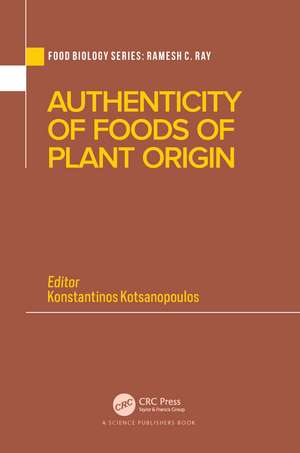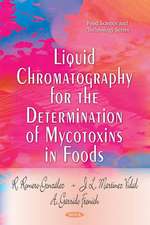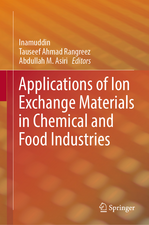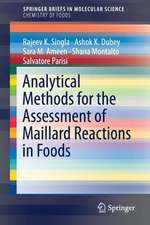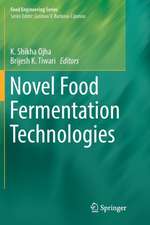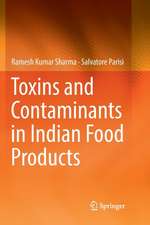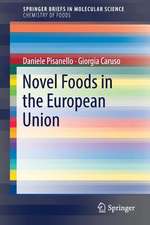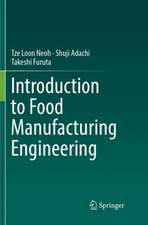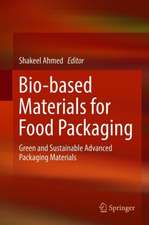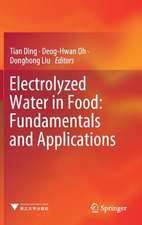Authenticity of Foods of Plant Origin: Food Biology Series
Editat de Konstantinos Kotsanopoulosen Limba Engleză Hardback – 16 iun 2022
This book reviews the latest developments in the field of authenticity of foods of plant origin, examining concepts such as traceability, and how they are applied to facilitate the support of claims, as well as legislative requirements in the major economies around the world. The basic techniques used nowadays in verifying authenticity of these types of foods are reviewed and discussed, and their applications are summarized. The book also focuses on categories of foods most prone to adulteration attempts due to their characteristics, properties and production methods commonly followed, thus allowing the reader to more easily identify the chapter that is of interest in each case. The book will be of interest to food industrialists, chemists, quality control scientists and technologists, microbiologists, analytical chemists and food physical chemists within the food industry. It is also aimed at academicians who are interested in the authenticity of foods of plant origin and the advancements in the analytical fields that support relevant legal and marketing requirements.
| Toate formatele și edițiile | Preț | Express |
|---|---|---|
| Paperback (1) | 493.12 lei 6-8 săpt. | |
| CRC Press – 8 oct 2024 | 493.12 lei 6-8 săpt. | |
| Hardback (1) | 1107.99 lei 6-8 săpt. | |
| CRC Press – 16 iun 2022 | 1107.99 lei 6-8 săpt. |
Din seria Food Biology Series
- 28%
 Preț: 371.12 lei
Preț: 371.12 lei - 13%
 Preț: 322.40 lei
Preț: 322.40 lei - 12%
 Preț: 315.26 lei
Preț: 315.26 lei - 27%
 Preț: 1049.50 lei
Preț: 1049.50 lei -
 Preț: 450.79 lei
Preț: 450.79 lei - 13%
 Preț: 318.59 lei
Preț: 318.59 lei - 11%
 Preț: 319.07 lei
Preț: 319.07 lei - 12%
 Preț: 315.00 lei
Preț: 315.00 lei - 15%
 Preț: 489.26 lei
Preț: 489.26 lei - 12%
 Preț: 339.73 lei
Preț: 339.73 lei -
 Preț: 493.12 lei
Preț: 493.12 lei - 12%
 Preț: 312.43 lei
Preț: 312.43 lei - 12%
 Preț: 312.43 lei
Preț: 312.43 lei - 12%
 Preț: 314.41 lei
Preț: 314.41 lei - 12%
 Preț: 326.63 lei
Preț: 326.63 lei - 11%
 Preț: 319.07 lei
Preț: 319.07 lei - 15%
 Preț: 452.95 lei
Preț: 452.95 lei - 8%
 Preț: 390.86 lei
Preț: 390.86 lei - 18%
 Preț: 1389.36 lei
Preț: 1389.36 lei - 15%
 Preț: 699.58 lei
Preț: 699.58 lei - 25%
 Preț: 370.39 lei
Preț: 370.39 lei
Preț: 1107.99 lei
Preț vechi: 1217.57 lei
-9% Nou
Puncte Express: 1662
Preț estimativ în valută:
212.01€ • 221.36$ • 175.47£
212.01€ • 221.36$ • 175.47£
Carte tipărită la comandă
Livrare economică 04-18 aprilie
Preluare comenzi: 021 569.72.76
Specificații
ISBN-13: 9780367146535
ISBN-10: 0367146533
Pagini: 296
Ilustrații: 22
Dimensiuni: 156 x 234 x 21 mm
Greutate: 0.62 kg
Ediția:1
Editura: CRC Press
Colecția CRC Press
Seria Food Biology Series
ISBN-10: 0367146533
Pagini: 296
Ilustrații: 22
Dimensiuni: 156 x 234 x 21 mm
Greutate: 0.62 kg
Ediția:1
Editura: CRC Press
Colecția CRC Press
Seria Food Biology Series
Public țintă
AcademicNotă biografică
Konstantinos Kotsanopoulos obtained his integrated master's degree (BSc+MSc) in Agriculture, Ichthyology and Aquatic Environment from the University of Thessaly, Greece, and his MSc in Food Science from the University of Reading, UK. He is a Senior Regulatory Professional based in the UK and employed in the private sector. His research experience includes studies on emulsions, microencapsulation, authenticity of foods, auditing trends, food quality control and safety systems.
Cuprins
1. Traceability 2. Authenticity-Quality Control of Agricultural Produces 3. Methods and Techniques for Verifying Authenticity and Detecting Adulteration 4. Authenticity of Tomato 5. Authenticity of Banana 6. Detection of Genetically Modified Organisms in Foods of Plant Origin 7. Authenticity of Maize/Corn 8. Authenticity of Rice 9. Authenticity of Wheat 10. Authenticity of Wine 11. Authenticity of Olive Oil 12. Overview of the Legislation Regarding Traceability and Authenticity of Foods of Plant Origin in EU, USA, Canada, Australia-New Zealand 13. Trends and Suggestions in Improving Authenticity and Traceability of Foods of Plant Origin
Descriere
The book reviews developments in the field of authenticity of foods of plant origin, examines concepts such as traceability, how they are applied to support claims, and legislative practices in some major economies. It offers an easy-to-follow reference to developments in techniques and methodologies used for detecting adulteration.
